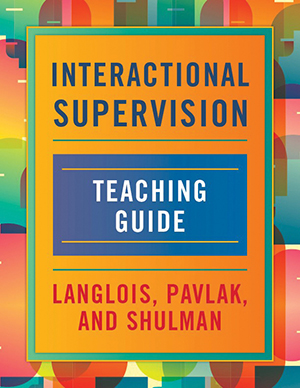
Interactional Supervision: A Teaching Guide for the 4th Edition, by Jamie Langlois, Christina Pavlak, and Lawrence Shulman, is a manual for instructors who teach using Shulman’s “Interactional Supervision” (fourth edition), one of NASW Press’s best-selling titles used primarily as a textbook.
For decades, Shulman’s text has been the standard-bearer for teaching supervision, introducing students to the interactional model, work-phase skills, skills of helping, and the concept of parallel process.
The guide is something different for the NASW Press in that it will only be sold to instructors and is published in PDF and PowerPoint formats, rather than in print or in eBook format.
“I have taught supervision courses for more than 10 years,” says co-author Langlois, DSW, LMSW, assistant professor at the School of Social Work at Grand Valley State University in Michigan. ”I was using Shulman’s text. During that time, I developed a lot of teaching materials. I kept having to revamp them during different accreditation cycles.”
“We have a fairly large social work program, and we needed to have more people teaching the course,” Langlois said. “There was a community member who was a supervisor of supervisors at her organization, and I approached her about teaching the course. That was Christina Pavlak, the co-author.”
“I was going over my materials to assist her, and she pointed out that this was valuable material,” Langlois says. “She suggested this could be used outside and not just for her.”
Langlois discussed the idea with Shulman about adding a few pages to his book. However, he felt like it would work better as a companion text.
“The separate text allowed us to provide more detail to the classroom exercises and online exercises,” Langlois said. “It helped us to integrate in the classroom the workplace skills, which are a big part of the text.”
“If you use this teaching guide alongside Larry’s book, educators would be able to easily take assignments from it and be able to communicate which competencies those assignments are addressing for curriculum purposes,” Langlois said.
Each chapter provides reflection and critical-thinking questions as well as in-class exercises and assignments and online exercises.